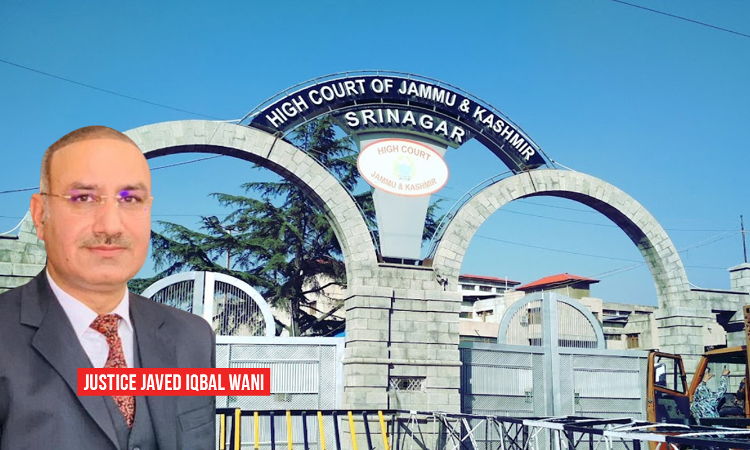- Home
- /
- High Courts
- /
- High Court of J & K and Ladakh
- /
- Courts Cannot Conduct Comparative...
Courts Cannot Conduct Comparative Study Of Natural Resource Allocation: J&K High Court Dismisses Plea Challenging Mining Lease Cancellation
LIVELAW NEWS NETWORK
26 April 2025 6:55 PM IST
Reaffirming the judiciary's restraint in matters of policy, the High Court of Jammu & Kashmir and Ladakh, while dismissing a writ petition seeking cancellation of mining leases, held that courts cannot conduct a comparative study of methods for distribution of natural resources, as such decisions fall within the exclusive domain of the Executive.Justice Javed Iqbal Wani, emphasized...
Reaffirming the judiciary's restraint in matters of policy, the High Court of Jammu & Kashmir and Ladakh, while dismissing a writ petition seeking cancellation of mining leases, held that courts cannot conduct a comparative study of methods for distribution of natural resources, as such decisions fall within the exclusive domain of the Executive.
Justice Javed Iqbal Wani, emphasized that disposal of natural resources is a matter of policy and judicial review cannot be invoked to substitute executive wisdom.
Citing In Re National Resources Allocation” reported in 2012 (10) SCC 1 the bench reiterated,
“.. a court cannot conduct comparative study of various methods of distribution of natural resources as it respects the mandate and wisdom of the Executive in such matters and that the methodology pertaining to the disposal of the natural resources is clearly a matter of policy wherein court lacks expertise therefor”.
These observations came in a plea wherein the petitioners had sought a slew of directions, including being declared as successful bidders for four minor mineral blocks in Shopian district. The petitioners claimed they had qualified both the technical and financial bidding stages following an e-auction notice and that a report uploaded online had declared them as the highest bidders.
However, the bid results were later rejected by the e-Auction Committee on the grounds that the bids received were non-competitive, having been submitted by a single participant for each block. The committee had found that the final bids were not above the base prices and thereby not in public interest, leading to a decision to not award the leases.
Contesting the petition the UT of J&K and the Geology and Mining Department submitted that being the highest bidder did not automatically entitle the petitioners to allotment. Further, they raised a serious preliminary objection regarding the maintainability of the petition, citing suppression of material facts by the petitioners.
The Court found substance in this objection. It noted that petitioners had previously filed civil suits over the same subject matter before the District Judge, Jammu in September 2011, an important fact concealed in their writ petition. The Court observed that the petitioners had not only withheld this information but had also falsely sworn affidavits asserting that no other proceedings were pending in any court.
Quoting extensively from precedent, Justice Wani referenced Prestige Lights Ltd. v. State Bank of India (2007), K.D. Sharma v. SAIL (2008), and Manohar Lal v. Ugrasen (2010) to reiterate that a litigant seeking equitable relief under Article 226 of the Constitution must come with clean hands. The Court highlighted that suppression of material facts undermines the integrity of the judicial process and disentitles a petitioner from any relief.
Despite this disqualification, the Court went on to examine the merits of the case. It referred to the Supreme Court's decision in In Re: Natural Resources Allocation (2012) where the apex court held that while the State must strive for revenue maximization in allocating resources, the choice of method whether auction or otherwise is a matter of policy. Courts, the Supreme Court had warned, should not interfere with such decisions as they lack institutional expertise in policy formulation, Justice Wani accentuated.
Relying on this precedent, Justice Wani concluded that the petitioners' claim to be declared successful bidders could not be sustained merely on the basis of being the highest bidders in a non-competitive auction. The discretion to accept or reject bids lay with the executive authority, and the judiciary could not second-guess such decisions, especially when the policy rationale was sound and well-articulated, the court reasoned.
In view of the concealment of material facts and in line with the observations made above, the Court dismissed the petition. While refraining from initiating criminal proceedings for the false affidavits, it imposed a cost of Rs. 50,000 each on petitioners to be deposited within two weeks.
Case Title: Rahil Chowdhary Vs UT Of J&K
Citation: 2025 LiveLaw (JKL) 165



